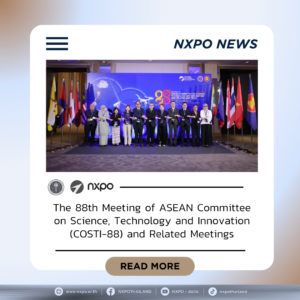NXPO President Dr. Kitipong Promwong recently gave a talk at RUTS Foresight Seminar organized by Rajamangala University of Technology Srivijaya (RUTS). His talk is centered around high education and its role in research and innovation. The seminar was aimed at updating university staff on the national policy and for the preparation of RUTS’s 20-year strategic plan.

In his talk, Dr. Kitipong listed six global issues that have made a big impact to Thailand and that universities would need to prepare for, namely 1) COVID-19 pandemic, 2) multi-stage life and aging society, 3) disruptive innovation and digital transformation, 4) social disparity and poverty, 5) climate change and shortage of resources, and 6) geopolitical power shift from the West to the East. The COVID-19 has set the course for new normal lifestyle, accelerating the growth of digital technology to support the work-from-home arrangement, e-commerce and on-line entertainment while slowing down the growth in sectors such as renewable energy, robotics and mega projects. The pandemic has also brought back issues such as poverty and globalization, prompting countries to engage in self-reflection and attempt to draw foreign investment to their countries and region.
Dr. Kitipong cited the forecast made by Thailand Development Research Institute (TDRI) that the Thai economy would return to the pre-COVID level in 2023 at the earliest. Meanwhile, domestic consumption and investment continues to slow down with high debt accumulation. The government spending is increasingly restricted. Despite low reported number of unemployment, the risk of unemployment is very high. On the public health front, the possibility of pandemic persistence urges people to be more vigilant on their healthcare measures.
As businesses slow down, workers are migrating from big cities to upcountry, joining agricultural sector. The trend in alternative proteins such as plant-based meat offers a new opportunity for farmers. Smart farming will play a vital role in transforming Thai agriculture. Universities, therefore, can help support knowledge and technology to enable Thai farmers to develop high value farm products such as premium fresh fruit for export market.
In the manufacturing and service sector, sectors such as food, electronics, medical supplies and healthcare service are experiencing growth. Healthcare service in the forms of telehealth and telemedicine will be increasingly used, especially for non-communicable disease cases.
Dr. Kitipong pointed out that universities would need to develop a long-term plan to deal with increasing unemployment rate and disruptive technology. Under the new normal education, universities must prepare to compete with non-formal education platforms available on-line. Ministry of Higher Education, Science, Research and Innovation is planning to promote upskilling program for corporate employees to study while still working.
Dr. Kitipong shared with the audience new policy and recent initiatives launched by the ministry which would have implication on universities, namely 1) area-based development for poverty reduction, 2) Bio-Circular-Green Economy (BCG Economy), 3) frontier research (nuclear, synchrotron and quantum technologies), 4) space consortium for satellite and remote sensing, 5) Thailand Academy of Social Sciences, Humanities and Arts (TASSHA) and 6) the inclusion of non-research work as academic outputs.
During his conclusion, Dr. Kitipong suggested areas where RUTS could play an active role in driving various upcoming transformations, namely 1) Industrial and Technology Transformation: SME 4.0, new industries such as electric vehicle, automation and bioenergy, 2) Agricultural Transformation: smart farming and smart farmers, and 3) Tourism Transformation: smart and creative city with efficient transport system, city planning and public space.









